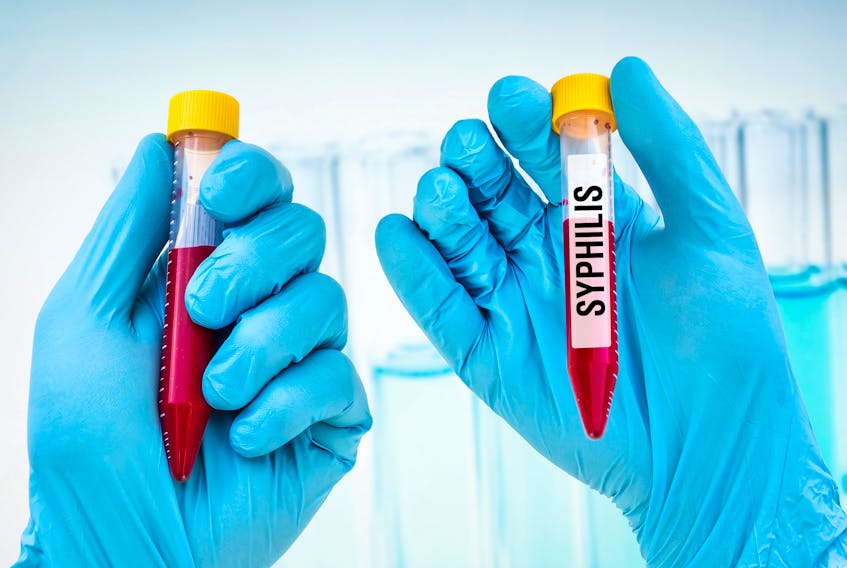SYDNEY, N.S. — Nova Scotia Public Health officials have declared a provincewide outbreak of syphilis, which differs from a previous outbreak in 2009 which was mainly contained to the Halifax area.
Officials announced Monday that preliminary data recorded 82 cases province-wide in 2019. That up from about 50 cases in 2018 and 38 cases in 2017. Cases to date have been diagnosed in people ages 20-to-65 and over, with reports from every area across the province. There is no breakdown currently available by health zone.
Syphilis is a bacterial sexually transmitted infection contracted through unprotected anal, oral or vaginal sex. It can cause serious and permanent damage to the body if untreated.
Dr. Gaynor Watson-Creed, the province's deputy medical officer of health, said in a teleconference with reporters that it is too soon to say whether there are any clusters of the illness.
“There is no part of the province untouched by syphilis, at this point,” she said.
Officials noted there also appears to be an increasing proportion of cases among females at 20 per cent, in 2019, compared to 10 per cent in 2018 and five per cent in 2017, a trend which is being seen in other Canadian jurisdictions.

Christine Porter, executive director of the Ally Centre of Cape Breton, said while she couldn’t discuss numbers, syphilis is present in Cape Breton and stressed the importance of anyone who suspects they may have been exposed being tested. The Ally Centre offers testing.
“We’re trying to get the word out there that testing is available so come and get tested and we can facilitate access to treatment for syphilis if they are positive,” Porter said.
“We always said that our best protection right now is condoms … we always said even though there’s very few cases of HIV here, there’s other diseases where we really have to be responsible for our own health and using those protections.
Drop-in hours for testing at the centre are Monday, Tuesday and Thursday from 9 a.m. to 2 p.m., or you can phone 902-567-1766 or 902-567-1123 to make an appointment.
One possible factor behind the rise infections may be a fatigue around safe sex messaging, suggested Watson-Creed.
Symptoms can include an open sore at the point of infection, a flu-like illness, muscle aches, fatigue, or a rash on the chest, back, palms of hands and bottoms of feet. Some people who are infected don’t have any symptoms.
Syphilis is treatable with antibiotics. But if it goes untreated, later stages can affect the brain, heart and other organs, or result in death.
Safer sex practices, including the use of condoms and oral dams, can help prevent transmission.
An outbreak was declared in Halifax area in 2009, peaking in 2013 with 84 cases. However, after an aggressive education campaign, Watson-Creed said number returned to baseline levels in the intervening years.
To date, there have been no reported cases of congenital syphilis in Nova Scotia, where the infection is transmitted from a pregnant woman to her baby, which can cause miscarriage, stillbirth or birth defects. While testing for STIs has always been recommended early in pregnancy, testing is also now recommended at 24 to 28 weeks, as well.
Anyone with questions about syphilis is asked to contact your health-care provider or call their local Public Health office. Nova Scotians can also call 811 for non-emergency health advice from a registered nurse.
Symptoms of Syphilis
- An open sore at the point of infection (genital area, anus, mouth or lips)
- Flu-like illness
- Muscle aches and pains
- Fatigue
- A rash on the chest, back, palms of hands and bottoms of feet
- Symptoms may first appear 10 to 90 days after a person becomes infected, with the average period of time being 21 days, but some people may not experience any symptoms.
- Syphilis is treatable with antibiotics. Later stages of the STI can seriously the brain, heart and other organs, or even result in death.
RELATED: Small cluster of syphilis cases only small part of STI problem in Cape Breton









